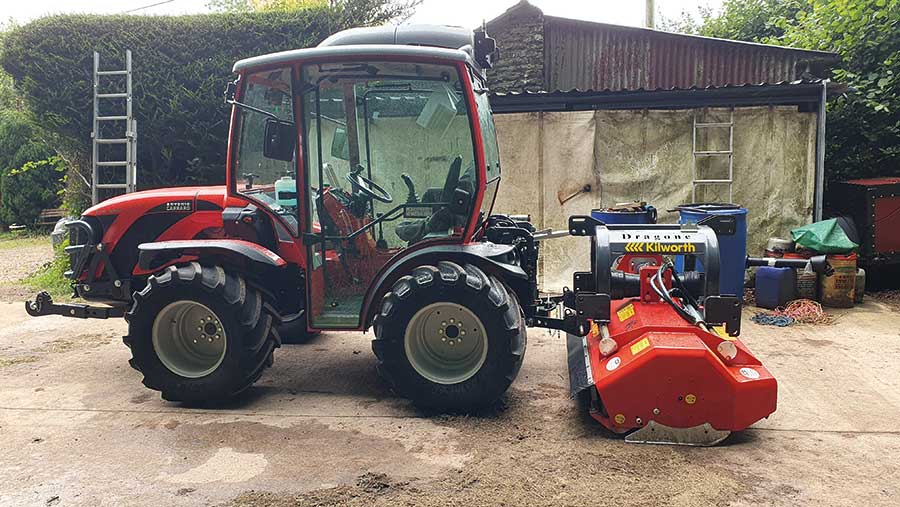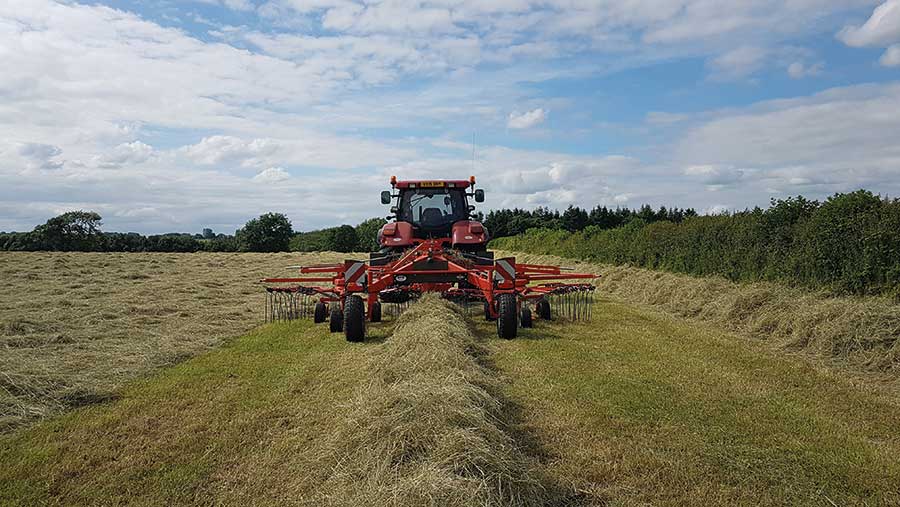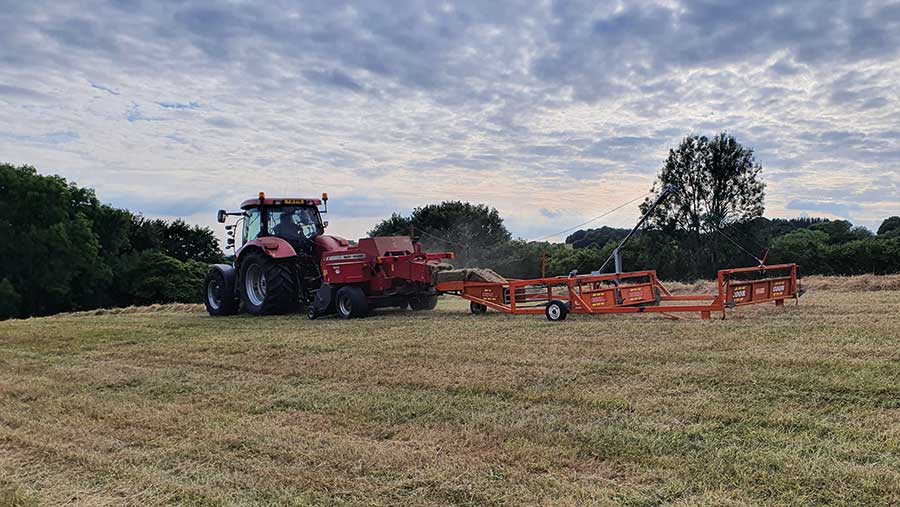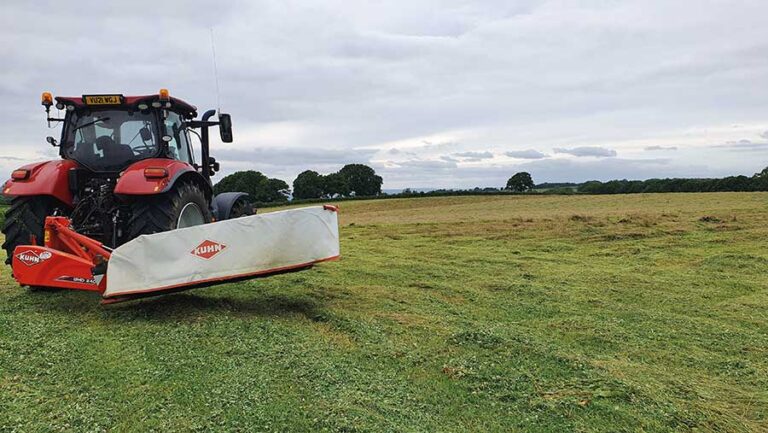Headed up by the father-and-son partnership Ian and Alastair Morgan, RNG Morgan and Son is focused on contracting work within a eight-mile radius of the base – located between Chepstow and Monmouth. However, Ian’s father, Robert, initially started the business as a tenant farmer in the late 1970s.
“When my grandfather decided to retire in 2002, my dad had already started offering some contracting work to help boost the farm’s income,” Alastair explained. “As he had a small customer base established, he decided to transition into contracting full time.”
Ahead of the farm dispersal sale, Ian purchased a tractor, hedgecutter and topper from the family business, initially focusing on smallholdings and stable yards in the area.
Recognising that there was high level of competition in the area, Ian has gradually developed the business around smaller scale operations that larger firms cannot justify doing and niche work – the most significant of these is conventional baling, with the company producing between 15,000 and 20,000 small bales of hay between June and September each year.
There’s also the use of alpine equipment to tackle grassland and scrub work across the hilly county. Ian purchased his first Antonio Carraro – a 35hp ex-demonstration machine with a rollover bar and hydrostat transmission.
Complementing this with lightweight, narrow working width implements, Ian attracted interest from the Gwent Wildlife Trust and Natural Resources Wales, as well as farmers on the steepest ground.

The Antonio Carraro has been updated twice since then, with the latest 78hp model arriving on farm last year, purchased new from the UK distributor Kirkland UK.
For Ian and Alastair, one of the major benefits of the brand is the reverse-drive function, which means that during topping work, the tractor is not driving over the ground ahead of the topper.
“Because Kirkland is based in Maidstone, we were a little concerned that they would not be able to provide the level of backup we needed,” Alastair noted.
“However, they have been brilliant so far with a couple of minor issues we’ve had, with someone always willing to come out and see us.”

The next generation
Alastair had always helped his dad when possible, but joined the business full time after completing a land-based engineering diploma at Hartpury College.
“It was one of the best things I ever did,” he explained. “I learnt so much from that course that I have been able to integrate into our business. I’d recommend anyone who has an interest in agriculture.”
He also brought additional work through his time in Young Farmers. The friends he has made there have since approached Alastair for sub-contracting work, which now makes up a significant amount of summer work.
“I’m often travelling with other contracting gangs, helping them with silaging,” he said. “For one customer, I put 350 hours on my tractor with them in one year.”
Since Alastair joined the business, and was subsequently made a partner in 2018, both he and Ian have focused investment to improve both their comfort on the job, and efficiencies for their customers.
They initially added an ex-demonstration Case IH Maxxum 110 to the fleet, which now has more than 10,000 hours on the clock, then in 2015 they decided to add an additional tractor – opting for a brand new Maxxum 130 CVX.
“That was our first tractor with a continuously variable transmission, and we would never go back now. We’ve since added a new 145 CVX to the fleet,” Alastair explained.
“We also specified a front linkage and PTO on the machine, which we’ve done since 2000. At the time, it was over-speccing slight but it has become something we always look for now as we’ve increased the size of our grassland kit.”
That grassland equipment primarily comes from Kuhn Farm Machinery, which Alastair believes is the best on the market. “I’ve even convinced some of the larger contracting firms that I work with to try it out.”
Ian and Alastair run a GMD 240 rear mower, which is followed by either a six- or eight-rotor tedder. Alastair explained that the smaller diameter rotors on the Kuhn tedders offer a noticeably faster drying time than some other machines they have tried. These are followed up by a trailed twin-rotor rake, also from Kuhn.
They opted for a trailed model due to the steep ground they find themselves working on, with a steered axle to help with narrow gateways.
“We had used a haybob, which wasn’t an issue with the acreages we cover but upgrading to larger tedders and rakes has helped us keep the baler at full capacity and enabled us to get more crop down and drying so that we can take advantage of the shorter weather windows,” Alastair said.
Baling is done with a Massey Ferguson in-line conventional baler. As collecting and stacking the bales is labour intensive, Ian and Alastair source labour from local farms and Young Farmers to help them.
One operation that is not offered, but which is often requested, is round baling.
“We’ve seen a massive influx in how many customers want conventional bales, as a small amount can be convenient to keep on hand, however round baling is still the most popular in our area,” Alastair said.
Rather than invest in a machine of their own, however, they have continued to strengthen relationships with other local contractors, bringing sub-contractors in to help complete work for customers.
“We are obviously geared up for the making and rowing up, then just use someone for baling and wrapping if needed. We have our own gear then for moving with squeeze/spikes, or twin bale carrier/bale trailer.”

Justifying the cost
While investment has been consistent over the last 10 years, Alastair notes that the significant jump in machinery prices has forced them to reconsider certain purchases in the last 12 months.
“We don’t have a set replacement policy, but we like our kit to be neat and tidy and for maintenance costs to remain low over the working life,” he said. “There are some machines that we should have traded in already, but, honestly, the cost of replacement has become too much and it’s hard to see how we can justify that level of expense.”
He went on to say that the increased costs would be the biggest issue for farmers and contractors over the coming years, especially as more pressure for investment is placed on agricultural businesses from environmental schemes. “It is a worry, especially when families have worked so hard to build these businesses.”
Despite this, the prospects for the business look good. Ian and Alastair are busier than ever, having found niches amongst the general contractors in the area. “We tend to do the jobs that other people hate,” said Alastair with a laugh. “Take fencing. We do a lot of jobs that end up on hillsides, or in tight corners of fields.
“But we’re good at it, and we take a lot of pride in what we do. We treat every job like its our own ground and that has brought us a lot of success.”


